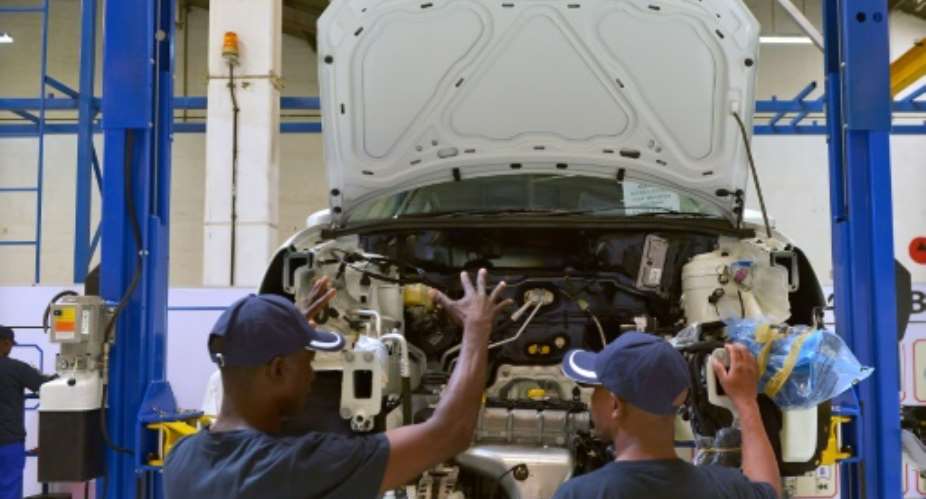Nairobi (AFP) - Volkswagen on Wednesday inaugurated a new assembly plant in Kenya, returning to the East African country after four decades as it seeks to take advantage of surging car sales on the continent.
The German car manufacturer's return to Kenya comes just weeks after it signed a deal to build an assembly plant in Algeria, and ahead of a trip by its brand chief to Rwanda for a new project.
"Overall car sales in Africa are bound to rise by 40 percent within the next five years, that is why we are expanding our business," said Volkswagen Brand CEO Herbert Diess.
"It is fair to say that the whole continent has seen a long period of economic stagnation, but just like China in the early 80s Africa offers great business opportunities. That holds especially true for Kenya."
The assembly plant in the industrial town of Thika is expected to produce cars for Kenya as well as the wider East African market, starting with the Polo Vivo, described as the company's most successful passenger car model in Sub-Saharan Africa.
 Kenyan President Uhuru Kenyatta launches a new assembly line for Volkswagen's Polo Vivo on December 21, 2016
Kenyan President Uhuru Kenyatta launches a new assembly line for Volkswagen's Polo Vivo on December 21, 2016
Kenyan President Uhuru Kenyatta said the investment by Volkswagen was in line with government policy to industrialise his country's economy.
"With the opening of this facility, I expect to see a lot of VW government vehicles. I hope the county governments will also buy Volkswagen cars," Kenyatta said.
According to a January report by Deloitte Africa Automotive Insights, a rise in incomes in Kenya is driving the sales of motor vehicles -- accounting for 1.5 percent of consumer expenditure in 2015.
Passenger vehicles were Kenya's fourth-largest import in 2014, and the volume of imported cars grew 300 percent between 2003 and 2012. Many of the imports are second-hand cars from Japan or the United Arab Emirates.
"If the current trend of 10 percent to 12 percent growth per annum on vehicle imports is to be maintained, Kenya will have five million vehicles on the road by the year 2030," reads the report.
Kenya currently only does small scale assemble of motor vehicles at three plants, all of which are operating below capacity, according to Deloitte.
Deloitte sees Africa as the "final frontier" for the global automotive industry, with its enormous growth potential.
The motorisation rate on the continent is only 44 vehicles per 1,000 inhabitants compared to a global average of 180 vehicles per 1,000 inhabitants.





 Elisu By-election: "If you call yourself a man, boo Chairman Wontumi again" — Bo...
Elisu By-election: "If you call yourself a man, boo Chairman Wontumi again" — Bo...
 Fuel tanker driver escapes with his life after tanker goes up in flames near Suh...
Fuel tanker driver escapes with his life after tanker goes up in flames near Suh...
 Uniform change: ‘Blue and white are brighter colours’ — Kwasi Kwarteng explains ...
Uniform change: ‘Blue and white are brighter colours’ — Kwasi Kwarteng explains ...
 MoE not changing all public basic school uniforms but only newly built ones — Kw...
MoE not changing all public basic school uniforms but only newly built ones — Kw...
 We’re only painting new public basic schools blue and white – Dr. Adutwum clarif...
We’re only painting new public basic schools blue and white – Dr. Adutwum clarif...
 Bawumia has lost confidence in his own govt’s economic credentials – Beatrice An...
Bawumia has lost confidence in his own govt’s economic credentials – Beatrice An...
 I fought WW2 at age 16 – WO1 Hammond shares At Memoir Launch
I fought WW2 at age 16 – WO1 Hammond shares At Memoir Launch
 GRA-SML deal: Regardless of what benefits have been accrued, the contract was aw...
GRA-SML deal: Regardless of what benefits have been accrued, the contract was aw...
 April 26: Cedi sells at GHS13.75 to $1, GHS13.18 on BoG interbank
April 26: Cedi sells at GHS13.75 to $1, GHS13.18 on BoG interbank
 Champion, promote the interest of women if you become Vice President – Prof. Gya...
Champion, promote the interest of women if you become Vice President – Prof. Gya...
